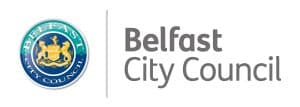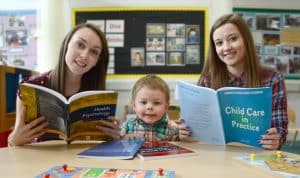Stranmillis University College, in partnership with Belfast City Council, has developed this innovative higher education, Teaching Assistant Certificate Course. Places are now available from Belfast City Council for September 2024 starts.
 The Classroom Assistants Certificate offers Higher Education Level (equivalent to Level 4) training to support both existing classroom assistants and those seeking employment as a classroom assistant as they develop their skills, and will, where relevant, provide opportunities for future employment progression.
The Classroom Assistants Certificate offers Higher Education Level (equivalent to Level 4) training to support both existing classroom assistants and those seeking employment as a classroom assistant as they develop their skills, and will, where relevant, provide opportunities for future employment progression.
This course aims to build confidence within classroom support teams by focusing on the development of the child or young person’s wellbeing and social learning skills. Understanding how to mentor the individual with needs, while working with the teacher/tutor to develop new cognitive skills, is a core part of the course.
Student intake on the course, which is fully funded by Belfast City Council, is limited and an early application is advised.
Eligibility
As the course is fully funded by Belfast City Council, you must be a Belfast city council resident, working as a classroom assistant or aspiring to employment in this field, and have the desire to learn and develop within a classroom assistant role. You may be working in any region of Northern Ireland.
Ideally, you will have a relevant level 3 qualification or level 2 qualifications (for adults returning to education) with at least 3 years of relevant experience.
The course is studied over 1 year from September – June or January – December, one evening a week – normally on Wednesday or Thursday, 4-7pm, FULLY ONLINE. Topics below will be covered.
| Course |
|---|
| Supporting the Child's Social Learning, Resilience and Wellbeing |
| Planning for Learning and the Support Role of a Learning Assistant |
| Teaching and the Law: Inclusion and Needs |
| Schools and Colleges and the SEN New Code of Practice |
| The Autism Spectrum: Strategies for Specialist Learning Support |
| Working with Teachers and Learning Managers as a Learner's Coach and Guide: 7 Micro Skills |
Supporting the Child’s Social Learning, Resilience and Wellbeing
 This module offers a range of support tools and strategies in the classroom to meet the needs of the developing child while supporting their wellbeing during the return to school/college. Understanding the individual child is about developing an awareness of learning challenges, barriers and abilities. This offers a level of insight that raises the knowledge of the learning assistant/guide by exploring the following topics: how pupils learn, diversity and special educational needs, inclusion, pupil development and resilience and wellbeing.
This module offers a range of support tools and strategies in the classroom to meet the needs of the developing child while supporting their wellbeing during the return to school/college. Understanding the individual child is about developing an awareness of learning challenges, barriers and abilities. This offers a level of insight that raises the knowledge of the learning assistant/guide by exploring the following topics: how pupils learn, diversity and special educational needs, inclusion, pupil development and resilience and wellbeing.
Planning for Learning and the Support Role of a Learning Assistant
This module supports the learning assistant in their capacity to coach and mentor pupils they are supporting in terms of a social model of support at school/college. Topics covered include: lesson planning for the classroom assistant; working with teachers and staff to make suitable adjustments and prepare aids and resources to scaffold learning in relation to needs, working with a range of staff to manage pupil learning and promoting an achievement approach that supports whole-school developments for all pupils equally.
Teaching Assistants and the Law: Inclusion and Needs
This module offers an up to date perspective on the requirements of schools in terms of teaching, learning and assessment practices and the child with needs. Both equality and diversity are considered alongside the following topics: the new Special Educational Needs legislation and recording procedures, the culture of diversity and inclusion in schools and Colleges in NI, the various quality guides in terms of best practice for the inclusive school/College.
Schools and Colleges and the SEN New Code of Practice

Topics covered in this unit include: governance, SEN legislation and recording procedures and whole-school development planning, working with SENCOs and understanding the networks of support available within the infrastructure associated with schools and colleges.
The Autism Spectrum: Strategies for Specialist Learning Support
- Defining autism as part of a family of spectrum needs applicable to a range of behaviours and learning challenges;
- Diagnosing learning environment needs and associated behavioural remedies in support of safety and autism-friendly approaches to both social and communication skills.
- Developing strategies to better support the learning needs of the child or youth with sensory or social needs and communication for informed decision making.
Working with Teachers and Learning Managers as a Learner’s Coach and Guide: 7 Micro Skills
Topics in this unit include: working as a coach-mentor, counselling and facilitation skills, developing an approach to learner support that is appropriate in terms of mindfulness and wellbeing for all and supportive of ability and achievement with the school/college environment. Skills will be developed in the area of guidance and pastoral skills, listening and questioning skills, teaching support skills, target setting and cognitive development skills (support for learning levels and abilities).
If you require further information please email Louise on cpd@stran.ac.uk

